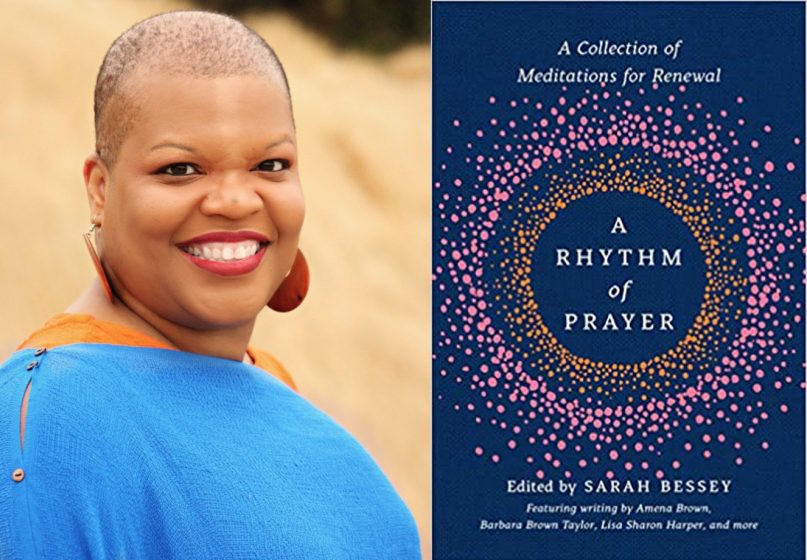(RNS) — “Dear God, please help me to hate White people …”
So begins the prayer of Dr. Chanequa Walker-Barnes, a Black Christian woman and professor of theology who has been working toward racial reconciliation for decades. Her prayer, recorded in the bestselling book, “A Rhythm of Prayer,” goes on, listing all the reasons why it would make sense to hate white people.
I learned about this “Prayer of a Weary Black Woman” on Twitter when Rod Dreher, a commentator I’ve read sporadically over the years, tweeted:
“Progressives preparing something terrible and violent for America. This left-wing prayer book embodies the spirit of Antichrist, petitioning God to grant one the spirit of anti-white racial hatred. It’s a bestseller, from a major publisher.”
He linked to his essay “A Rhythm of Racist Prayer.” His tweet included a picture of a Black woman (Walker-Barnes, I now realize) speaking at Biola University with the words “Reconciliation without Justice is Cheap” written on her T-shirt. I was intrigued.
RELATED: Why some Christians want Target to stop carrying a bestselling book of prayers
Dreher’s post is only worth reading as an example of a kind of knee-jerk reaction that demonizes rather than engages. Of course, in this case, Dreher, a Christian, is demonizing a fellow Christian, which makes it all the more awful. He misses the point and purpose of the prayer — a call to persevere in love — entirely.
Walker-Barnes wrote in the prayer she isn’t asking for help hating the really, really racist ones, the Ku Klux Klan members and neo-Nazis. And she doesn’t want to hate the ones who are allied with the cause of justice.
No, she explains, she wants to hate the “nice White people.” The ones who would have her over for dinner but feel squeamish about Black Lives Matter. Or the white progressives who have read enough books to sound like they understand and care about vague concepts like racial justice but who actually undermine the cause.
I could feel the tension in my chest as I read Walker-Barnes’ words the first time. She’s a Christian! She’s a minister! Why would she want to hate white people? Why does she want to hate me?
Her prayer got my attention. It reminds me of all the people in the Bible who don’t want to love the people God wants them to love. Walker-Barnes mentions Jonah, unwilling for his enemies to change. I think also of the Psalmists who ask God to kill their adversaries (in vivid and graphic detail). And of Jesus’ disciples, who hate the Romans even when their leader tells them to love their enemies.
This prayer also humbles me. I am the one on the other side of this potential hatred. I have been the nice white person who tried to explain away what seem like “little” racist remarks. I am the nice white person fearful of acting as an ally, worried about what other white people will think, wondering whether it is all too extreme, unwilling to give so much of my time, of my heart. I am the nice white Christian who has done little to repent or to proactively love the vulnerable among us.
It reminds me of the first time I heard a Black woman challenge white Americans to read themselves into the Bible in the role of the oppressor.
What if I imagine myself as a part of the Egyptian army, complying with Pharaoh’s wishes to capture the Israelites once again? What if I see myself as one of the religious leaders in Jesus’ day who wanted to keep the status quo and tamp down revolutionary words like his? What if I stop only identifying with and spiritualizing the poor throughout the Bible and instead recognize I’m the one who needs to reckon with my riches before God?
If I let this prayer make me uncomfortable, then I will begin to understand why Walker-Barnes might long to hate someone like me.
RELATED: On late-night TV and bestseller lists, new books on prayer resonating with readers
And then, like her forebears who wrote so many Psalms of lament and imprecation, Dr. Walker-Barnes prays, “But.”
“But I will trust in you Lord. You have kept my love and my hope steadfast even when they have trampled on it.” She prays for beloved community.
In the end, Walker-Barnes invites me to do the work of repentance. She invites me to reconciliation. Through a prayer that begins with hatred, she invites me to enter into love.
After this prayer began to spread on social media, the pile-on of vitriol from conservative voices was enough that Sarah Bessey, editor of the prayer book in which this prayer was included, moved her social media to private status. It was enough for the other contributors to the book to issue a statement of solidarity and support.
Walker-Barnes herself posted a statement, saying critics have “targeted me for attack, harassing me through email, phone, and social media. In addition, they have bombarded my institution.”
I am sickened by the vitriol, especially coming from the mouths of fellow Christians. And I am grateful for the courageous work of faithful, loving, truth-telling, Jesus-following women like Dr. Chanequa Walker-Barnes.
(Amy Julia Becker is the author, most recently, of “White Picket Fences: Turning toward Love in a World Divided by Privilege.” The views expressed in this commentary do not necessarily reflect those of Religion News Service.)
RELATED: Amy Julia Becker reflects on the burden of white privilege






